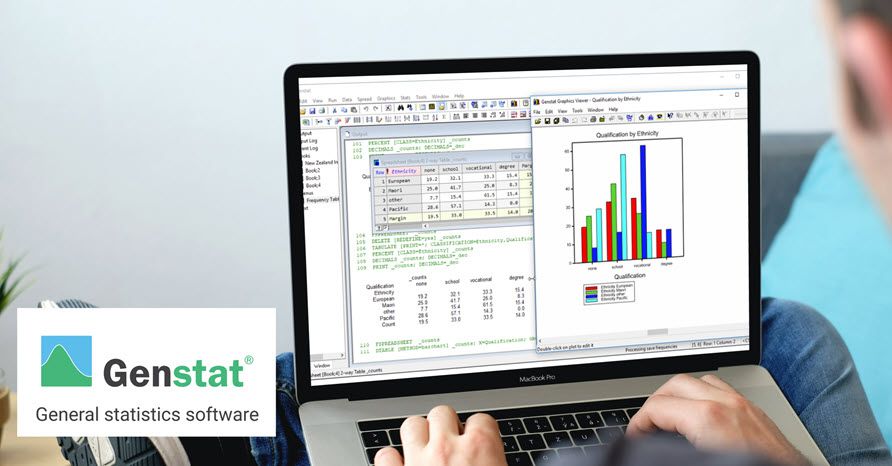Genstat: The ideal tool for plant breeding trial analysis
The VSNi Team
08 March 2023
As a plant breeder, having the right tools is essential for making informed decisions and getting the most out of your breeding programmes. Genstat is a comprehensive statistical software package that is ideal for use in crop and plant breeding. In this blog, we will discuss some of the key features of Genstat that make it a very valuable tool for plant breeders.
Ease of analysing spatial data from large field trials
Modelling spatial correlations is important when the plots (i.e., experimental units) are laid out in a grid where plots are closer together and therefore experience more similar environmental conditions than those further apart. Adequately accounting for spatial correlation is important because it can improve the estimation of the fixed (or random) treatment effects (i.e., increases precision and reduces potential bias) by modelling the spatial distribution of the residual effects more accurately. Genstat has powerful tools for analysing the type of spatial data generated by plant breeders. The ease of analysing spatial data from large field trials results from Genstat's powerful and comprehensive REML (linear mixed model) facilities and user-friendly menu interface.
Decision support tools analysing field data
One of the most challenging aspects when analysing field data is determining the best random and spatial models. Genstat's decision support tools for trials with incomplete-block or row-and-column designs make this considerably easier. It tries a range of appropriate random and spatial models and selects the best one for you. Furthermore, if you have a series of trials, Genstat has a tool that will not only automatically select the appropriate random and spatial models for each trial, but it will also combine the results together so that you can perform meta-trial analysis.
Meta-analysis tools for analysing raw data or summary statistics
Meta-analysis can be used to combine data from a series of independent but related experiments or trials. When done in a statistically robust way, it can increase the results' reliability, precision, and generalizability. For example, if you have multiple field trials comparing cultivars of wheat, a meta-analysis will enable you to combine the data from all these trials and provide you with better information on the cultivars.
Suite of procedures for statistical genetics
Genstat has a suite of procedures for statistical genetics, including genomic prediction, selection indexes, QTL linkage analysis, association mapping, etc. It also has tools to explore the phenotypic performance of plant genotypes in different environments using GGE biplots, AMMI models, Finlay & Wilkinson joint regression analysis, and stability coefficients. Additionally, it has tools to identify the genetic factors underlying phenotypic variation in plants by means of QTL linkage analysis or association linkage disequilibrium (LD) mapping from a genome-wide association study (GWAS).

Modelling nonlinear data
Regression is one of the most popular methods in statistics, and Genstat has a very powerful set of regression tools that are very straightforward and easy to use. These include menus for modelling growth curve data using nonlinear regression, such as exponential, logistic, and Gompertz models, allowing you to describe, estimate and compare the growth of plants under different environmental conditions. Moreover, in addition to all the standard growth curve models, Genstat provides you with the facilities to define your own nonlinear models.
Fitting GLMs, GLMMs, HGLMs
It is not uncommon for breeding analyses to have a phenotypic response that is non-Normally distributed. For example, the number of insect pests per plant, or whether or not the plant is susceptible to disease. These will have a Binomial or Poisson distribution, respectively. However, many statistical methods, such as ANOVA, linear regression, linear mixed models etc, make Normality assumptions. And thus, when we have data that is clearly non-Normal, these methods aren’t appropriate. Instead, GLMs should be used to analyse non-Normal data (or GLMM or HGLM when you have additional sources of random error, such as block effects). Genstat has a user-friendly menu interface for fitting generalized linear models (GLMs), generalized linear mixed models (GLMMs), and hierarchical generalized linear models (HGLMs) for analysing non-Normal data, such as counts and proportions.
Experimental design and automation
Genstat has the ability to generate robust and efficient experimental designs for field trials, including randomized block, split-plot, row-column, and cyclic designs. It also has the ability to automate routine analysis tasks using Genstat's programming language. If there is a standard experiment performed, or a trial run regularly, a pipeline of Genstat code can be created to generate the experimental design, analyse the data, produce summaries of the results and draw graphs.
In conclusion, Genstat is a comprehensive statistical software analysis tool for use in wheat and cereal breeding. With its advanced linear mixed model facilities and decision support tools for automating the analysis of spatial data, it makes the process of modelling plant breeding data easier and more efficient. The suite of procedures for statistical genetics, its ability to analyse non-Normal data, and its support for meta-analysis makes it an ideal choice for plant breeders. Additionally, its ability to generate robust and efficient experimental designs, as well as its ability to automate routine analysis tasks through its programming language, make it an indispensable tool for breeders looking to maximize the precision and reliability of their results. Genstat is a powerful and user-friendly tool that can greatly assist breeders in making data-driven decisions to improve the performance of their crops.
To explore Genstat in more depth, check out our demos, videos, or request a quote today.
Popular
Related Reads
